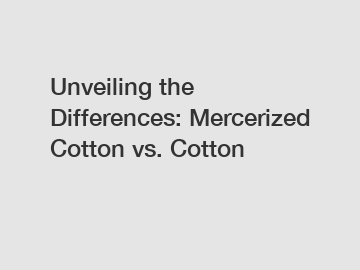Unveiling the Differences: Mercerized Cotton vs. Cotton
Unveiling the Differences: Mercerized Cotton vs. Cotton.
When it comes to cotton fabrics, there are several variations available in the market. One such variation is mercerized cotton, which stands out due to its unique attributes. In this article, we will explore the differences between mercerized cotton and regular cotton, shedding light on their respective features, benefits, and applications.
What is Mercerized Cotton?

Mercerized cotton is a specially treated version of cotton fabric that has undergone a process called mercerization. This treatment was first developed by John Mercer in the 19th century and involves treating cotton yarn or fabric with a caustic soda solution, followed by neutralization and washing. The treatment causes the cotton fibers to swell and straighten, resulting in a shiny and lustrous appearance.
Enhanced Strength and Durability.
One of the key differences between mercerized cotton and regular cotton lies in their strength and durability. Mercerized cotton undergoes structural changes during the mercerization process, making the fibers stronger and less prone to breakage. In comparison, regular cotton may be softer but is relatively weaker and less durable.
Improved Color Absorption.
Mercerized cotton has superior color absorption properties, making it an ideal choice for vibrant, long-lasting colors. The mercerization process opens up the cotton fibers, allowing dyes to penetrate more easily. As a result, mercerized cotton garments retain their color for longer periods and show enhanced resistance to fading.
Shinier Appearance.
Another noticeable difference is the appearance of the two cotton types. Mercerized cotton exhibits a sheen and lustrous surface, making it visually appealing. On the other hand, regular cotton has a more matte and subdued look. The shine of mercerized cotton is a result of the structural changes that occur during mercerization, which create a smoother surface and better light reflection.
Enhanced Absorbency.
Regular cotton is known for its excellent absorbency, which makes it a popular choice for towels and bedding. However, mercerized cotton takes absorption to the next level. The process of mercerization increases the surface area of the cotton fibers, allowing them to absorb and release moisture more efficiently. The improved absorbency of mercerized cotton makes it an excellent option for clothing items where comfort and moisture management are important.
Versatility in Applications.
Both mercerized and regular cotton have their own unique applications due to their inherent qualities. Mercerized cotton's enhanced strength and luster make it suitable for high-end clothing, luxurious bedding, and home furnishings. Regular cotton, on the other hand, is often preferred for casual wear, t-shirts, and everyday household items. Each cotton variant offers its own set of characteristics that cater to different needs and styles.
Conclusion.
In conclusion, mercerized cotton and regular cotton differ in terms of strength, color absorption, appearance, absorbency, and applications. Mercerized cotton is characterized by enhanced strength, improved color absorption, a shinier appearance, and increased absorbency. On the other hand, regular cotton is softer and has a more matte appearance. Understanding the differences between these two cotton types allows buyers to make informed decisions based on their specific requirements and preferences.
If you have any further questions or would like to explore the world of cotton fabrics, please feel free to contact us. We are here to provide you with all the information and assistance you need.
For more information, please visit cvc fabric, medical cotton fabric, china fabric supplier.


